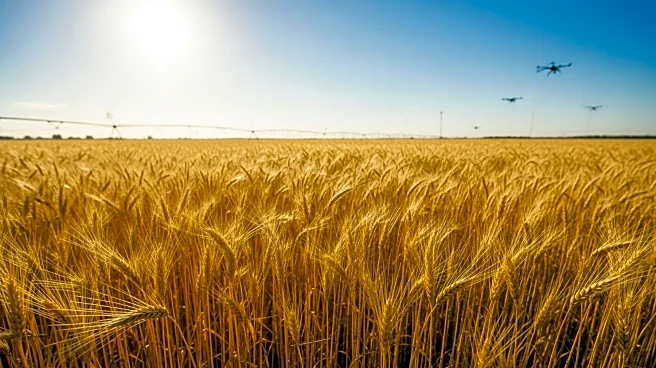What is the story about?
What's Happening?
The International Maize and Wheat Improvement Centre (CIMMYT) is actively working to develop climate-resilient wheat and maize varieties to address the challenges posed by increasing global temperatures. In 2022, a severe heat wave in Haryana, India, significantly reduced wheat yields, prompting CIMMYT to distribute climate-resilient seeds to farmers. These seeds, developed through conventional breeding techniques, are designed to withstand extreme heat and minimal rainfall. CIMMYT's efforts are part of a broader initiative to adapt agriculture to climate change, building on the legacy of the Green Revolution initiated by Norman Borlaug. The organization collaborates with local partners in 88 countries to distribute these seeds, aiming to secure food production in regions vulnerable to climate change.
Why It's Important?
The development of climate-resilient crops is crucial as heat waves become more frequent and intense, threatening global food security. In India, where wheat production is vital for feeding a significant portion of the population, the introduction of these resilient seeds could mitigate the impact of climate change on agriculture. This initiative not only supports farmers in maintaining their livelihoods but also helps stabilize food supplies and prices. As climate change continues to pose a threat to traditional farming practices, innovations like those from CIMMYT are essential for sustaining agricultural productivity and ensuring food security worldwide.
What's Next?
CIMMYT plans to continue its research and development of resilient crop varieties, working closely with regional partners to test and distribute these seeds. The organization aims to expand its efforts to other regions facing similar climate challenges. Additionally, there is a need for ongoing collaboration with local governments and agricultural institutions to ensure the successful adoption of these new crop varieties. As climate conditions evolve, CIMMYT's work will be critical in adapting agricultural practices to ensure long-term sustainability and resilience.
Beyond the Headlines
The shift towards climate-resilient agriculture raises important questions about the balance between crop-centric and soil-centric approaches. While CIMMYT's focus is on developing hardier crop varieties, there is a growing concern about the long-term impact on soil health. Critics argue that a more holistic approach, considering both crop and soil health, is necessary to ensure sustainable agricultural practices. This development also highlights the need for policies that support smallholder farmers, who are often the most vulnerable to climate change impacts.















